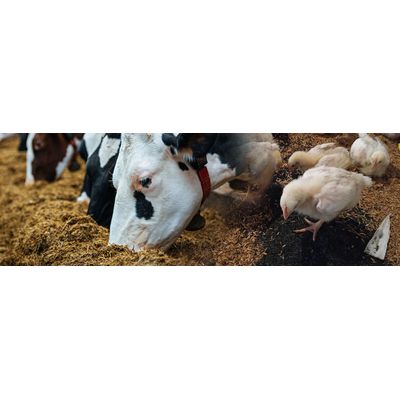

- Home
- Companies
- Beston Group Co., Ltd.
- Articles
- Enhancing Animal Digestion through ...

Enhancing Animal Digestion through Biochar Supplementation
The application of biochar in livestock feed is gaining traction as a sustainable approach to improving animal digestion and overall health. Biochar production processes yield a highly porous material, which when added to animal feed, offers several digestive benefits. This not only promotes animal well-being but also presents an opportunity for efficient nutrient absorption, ultimately contributing to better farm productivity and profitability.
Biochar’s Impact on Digestive Health
Biochar is a stable, carbon-rich material produced through the pyrolysis of biomass. Its inclusion in animal feed has been shown to positively influence digestive processes. One of the primary benefits lies in biochar’s high surface area, which provides a medium for the absorption and retention of nutrients. As ruminants and non-ruminants digest their food, the biochar particles act like a sponge, absorbing toxins, excess moisture, and harmful microbes in the gut.
This detoxification effect reduces the load of undigested or harmful compounds that would otherwise disrupt the gut microbiota, which is essential for proper digestion. By removing such elements from the digestive tract, biochar ensures that the feed is more efficiently utilized, enabling animals to better absorb essential nutrients.
Absorption of Toxins and Enhancing Gut Health
One of the most significant roles biochar plays in animal digestion is its ability to absorb toxins. Many feed ingredients, especially in industrial farming, may contain unwanted contaminants such as mycotoxins, heavy metals, and other pollutants. These toxins can disrupt animal digestion, leading to gastrointestinal issues and overall health deterioration.
Biochar’s porous structure enables it to capture and neutralize these harmful substances before they can be absorbed into the bloodstream. This detoxification process supports a healthier gut environment, reducing inflammation and preventing digestive imbalances that often lead to disorders such as diarrhea or bloating.
Furthermore, the inclusion of biochar in animal feed can enhance microbial activity within the digestive system. Biochar offers a stable surface for beneficial microorganisms to thrive, helping maintain a balanced microbial community. Healthy microbial populations contribute to the breakdown of complex feed components, improving nutrient digestion and absorption. In ruminants, for example, this leads to better fermentation of fibrous plant material, resulting in higher energy yield from the same amount of feed.
Improved Feed Efficiency
Efficient digestion of nutrients is crucial for maximizing the economic viability of livestock farming. Biochar plays a vital role in improving feed efficiency by ensuring that animals can extract more energy, proteins, and vitamins from their feed. This can lead to faster growth rates, improved weight gain, and better overall health, all of which contribute to greater farm profitability.
By enhancing feed conversion ratios, biochar reduces the amount of feed required for the same weight gain, lowering feed costs and minimizing waste. This efficiency is particularly beneficial in large-scale operations where feed constitutes a significant portion of operational expenses.
Reducing Gastrointestinal Disturbances
Gastrointestinal disturbances, such as bloating and indigestion, are common issues in livestock management. These disturbances can result in poor growth rates, higher veterinary costs, and even reduced lifespan. Biochar supplementation in feed has been found to alleviate these symptoms by enhancing gut motility and providing a natural buffer against stomach acids.
In some cases, biochar can also help regulate bowel movements, preventing conditions like diarrhea or constipation. For poultry, swine, and other livestock, this means more consistent and predictable digestion, leading to fewer health interventions and better overall performance.
Supporting Overall Animal Health
Beyond digestion, the benefits of biochar in animal feed extend to broader health improvements. As a natural, safe feed additive, biochar can help strengthen the immune system by limiting exposure to harmful pathogens and promoting a balanced gut flora. Its detoxifying properties also support liver and kidney function by reducing the burden of toxins circulating in the animal’s body.
Additionally, by improving digestion and nutrient absorption, biochar ensures that animals receive the full nutritional value of their feed. This results in healthier animals with better resistance to diseases, reducing the need for antibiotics and other chemical interventions.
Sustainable and Cost-Effective Solution
The inclusion of biochar in animal feed offers a sustainable solution to improving livestock health and digestion. Biochar is a byproduct of biochar production processes that utilize organic waste materials, such as agricultural residues, making it an environmentally friendly option for farmers. By recycling waste into valuable livestock feed supplements, biochar contributes to waste reduction and circular economy principles.
From a cost perspective, biochar’s ability to improve feed efficiency and reduce health-related issues results in lower overall farming costs. Farmers can experience increased productivity with fewer inputs, improving the sustainability of their operations over the long term.
Encouraging Adoption and Research
The positive impacts of biochar on animal digestion have garnered increasing interest from researchers and farmers alike. Ongoing studies continue to explore optimal dosages, potential benefits across different animal species, and the long-term effects of biochar supplementation. As more data becomes available, the adoption of biochar in animal feed is likely to expand, offering a cost-effective, sustainable, and health-promoting option for the livestock industry.
In conclusion, biochar is proving to be an innovative and effective tool for improving animal digestion. With its capacity to absorb toxins, promote gut health, and increase feed efficiency, biochar supplementation offers a comprehensive solution to support the health and productivity of livestock. By integrating biochar into animal feed practices, farmers can enhance their operations’ sustainability while ensuring healthier animals and improved economic outcomes.
